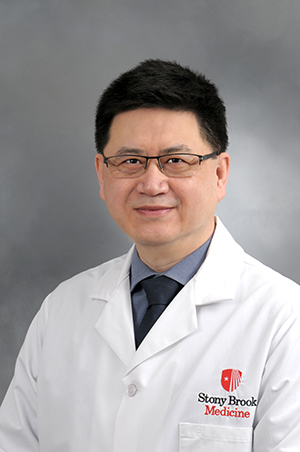Program Leaders

Jingfang Ju, PhD
Professor
Department of Pathology
Renaissance School of Medicine
at Stony Brook University
Fei Chen, PhD
Professor
Department of Pathology
Renaissance School of Medicine at Stony Brook University
Overview
The Oncogenic Drivers and Mechanisms of Carcinogenesis (ODMC) Program is one of the three basic research programs at Stony Brook Cancer Center. The program is a highly innovative and collaborative mechanism-driven scientific platform to discover paradigm-shifting cancer concepts and to foster translational cancer research.
The ultimate goal of the ODMC program is to improve cancer diagnosis, treatment and prevention through basic and translational research. Our unique multidisciplinary approach spans areas such as investigating the mechanisms and function of oncogenic driver genes that impact tumor progression and metastasis, tumor microenvironment, mechanisms of drug sensitivity and resistance, and epigenetic sources of tumorigenic traits.
We discover mechanisms of DNA damage and repairs and carcinogenesis caused by environmental carcinogens via innovative DNA-adductomics discovery for cancer prevention. We investigate genetic and epigenetic alterations that impact cancer resistance, epithelial-mesenchymal transition, mechanism of inflammation and immune evasion and to provide and validate novel targets as basis of new anticancer therapeutics intervention. Our inter- and intra-program collaborations and close alliances with clinicians place us in a unique position, allowing the ODMC Program to expedite translational research and help make a significant impact on cancer care for Long Islanders and, eventually, the global patient population.
Program Goals
The ODMC Program is organized into three interrelated specific aims:
Aim 1. Characterize the role of frequently mutated cancer driver genes in tumor maintenance and develop strategies for therapeutic intervention. The basic premise of this aim is that cancer is in large part a genetic disease, caused by the accumulation of genetic alterations in key cancer genes (oncogenes and tumor suppressors), and that potentially effective treatments can be developed by understanding in molecular detail how alteration of these critical genes promotes tumor growth. Several members aligned with this aim study the oncogenic mechanisms and tumor maintenance functions of cancer genes including TP53, KRAS, JAK2, and STAT3.
Aim 2. Clarify the role of dysregulated protein coding and non-coding genes in oncogenesis and develop novel therapeutic strategies. ODMC members are investigating roles of tumor maintenance by understanding tumor invasion through innovative in vivo imaging technologies, and cell-cell communication by single cell RNA-seq approach to identify genes that are involved in maintaining tumor microenvironment, immune destruction and angiogenesis. In addition, ODMC members are investigating mutationally activated oncogenes such as Her2/ERBB2, RNF8, USP2, tyrosine kinases such as Brk, Ack1, Src in breast cancer, KLF4 and KLF5 in the development of colorectal and pancreatic cancer, and chemoresistance mechanisms and therapeutic development of non-coding microRNAs in colorectal, pancreatic and breast cancer.
Aim 3. Elucidate mechanisms of DNA damage repair responses and chemically induced carcinogenesis. ODMC members are investigating mechanisms of DNA damage recognition, mutational specificity, DNA replication and repair at the cellular, molecular and genetic levels. Members also developed DNA-adductomics to study chemically induced DNA damages and identifying DNA adduct signatures for renal cancer. Members have recently developed a collaborative project with investigators from the School of Marine and Atmospheric Sciences (SOMAS) at Stony Brook University to investigate DNA adduct signatures caused by environmental carcinogens.
Program Members
Evguenia Alexandrova, PhD
Raymond Bergan, MD
Agnieszka B. Bialkowska, PhD
Paola Boffetta, MD, MPH
Rachel Boykan, MD, FAAP
Fei Chen, PhD
Jiang Chen, PhD
Jun Chung, PhD
Bruce Demple, PhD
Grigori Enikolopov, PhD
Pamela Ginex, EdD, MPH, RN, OCN
Chiung-Kuei Huang, PhD
Jingfang Ju, PhD
Hyungjin Kim, PhD
Harini Krishnan, PhD
Pawan Kumar, PhD
Ke Jian “Jim” Liu, PhD
Ed Luk, PhD
Yupo Ma, MD, PhD
Michael Mak, PhD
Peng Mao, PhD
Natalia Marchenko, PhD
Benjamin L. Martin, PhD
W. Todd Miller, PhD
Jyoti Misra, PhD
Ute Moll, MD, MS
Anne Moyer, PhD
Alice Nemajerova, PhD
Iwao Ojima, PhD
R. Scott Powers, PhD
Gilbert Rahme, PhD
Nancy Reich-Marshall, PhD
Kanokporn Rithidech, PhD
Markus Seeliger, PhD
Brian Sheridan, PhD
Kenneth R. Shroyer, MD, PhD
Mario Shields, PhD
Flaminia Talos, MD, PhD
Chitra Thakur, MS, PhD
Ledong Wan, PhD
Zhishan Wang, MD, PhD
Ziwei Wang, MD, PhD
Jennie Williams, PhD
Ryan Williams, PhD
Chengfeng Yang, PhD
Vincent Yang, MD, PhD
Wei Yang, PhD
Huichun Zhan, MD, MS

